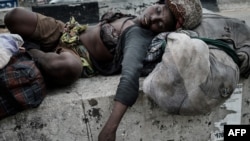Nearly half the total population in Nigeria lives in extreme poverty. Nigerian authorities are working to improve the situation, but experts say government plans are not sustainable.
Uzoamaka Ndugo is struggling to raise five children in Abuja after separating from her husband six years ago.
To make ends meet, she sells plastic bottles. However, Ndugo says her income averages about $30 per month, hardly enough to provide for her family.
"Since my husband left me with the children, I've been the one taking care of them from the sales of my plastic bottles, I have no other job," Ndugo said. "It's not easy for me."
Some 93.7 million Nigerians live in extreme poverty, according to the World Poverty Clock, a data-gathering team that monitors the global progress against poverty. This year's figure is 6.8 million higher than in 2018.
In June last year, the group named Nigeria the world poverty capital after it overtook India having the highest proportion of poor people.
Economic experts like Nonso Obikili say an imbalance in economic growth and population growth is a major factor contributing to Nigeria's rise in poverty.
"On a fundamental level the economy is not growing fast enough, economic growth is still below 2 percent and population growth is about 2.8 percent, so that means on average Nigerians are getting poorer and poorer," Obikili said. "But even if you dig deeper, even when the economy was growing, the growth wasn't that inclusive so it was a growth that was captured by a very small fraction of the country, with most of Nigeria remaining in stagnation."
Nigerian officials have been trying to address the issue through various social schemes.
Government programs
This month, President Muhammadu Buhari reiterated his commitment to lifting millions from poverty.
"Our ongoing social intervention programs continue to target these vulnerable groups through the ongoing school feeding program, government economic empowerment program, ... job creation program loans for traders and artisans, conditional cash transfers to the poorest families," Buhari said.
However, Obikili argues the government's plans are not enough, especially its cash transfer program to poor families.
"And if you're in an environment where economic growth is strong, you can make the case for that," he said. "But if you're in an environment where there's no economic growth, then it's not clear how redistributive policies can reduce poverty sustainably."
Buhari's lofty goal is to alleviate 100 million Nigerians from poverty within the next decade. But experts say to increase the Poverty Escape Rate in the country, economic growth must remain steady and population growth controlled.












